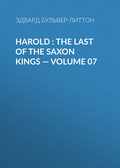
Эдвард Бульвер-Литтон
The Disowned — Complete
CHAPTER XXXIV
“Make way, Sir Geoffrey Peveril, or you will compel me to do that I may be sorry for!”
“You shall make no way here but at your peril,” said Sir Geoffrey; “this is my ground.”—Peveril of the Peak.
One night on returning home from a party at Lady Westborough’s in Hanover Square, Clarence observed a man before him walking with an uneven and agitated step. His right hand was clenched, and he frequently raised it as with a sudden impulse, and struck fiercely as if at some imagined enemy.
The stranger slackened his pace. Clarence passed him, and, turning round to satisfy the idle curiosity which the man’s eccentric gestures had provoked, his eye met a dark, lowering, iron countenance, which, despite the lapse of four years, he recognized on the moment: it was Wolfe, the republican.
Clarence moved, involuntarily, with a quicker step; but in a few minutes, Wolfe, who was vehemently talking to himself, once more passed him; the direction he took was also Clarence’s way homeward, and he therefore followed the republican, though at some slight distance, and on the opposite side of the way. A gentleman on foot, apparently returning from a party, met Wolfe, and, with an air half haughty, half unconscious, took the wall; though, according to old-fashioned rules of street courtesy, he was on the wrong side for asserting the claim. The stern republican started, drew himself up to his full height, and sturdily and doggedly placed himself directly in the way of the unjust claimant. Clarence was now nearly opposite to the two, and saw all that was going on.
With a motion a little rude and very contemptuous, the passenger attempted to put Wolfe aside, and win his path. Little did he know of the unyielding nature he had to do with; the next instant the republican, with a strong hand, forced him from the pavement into the very kennel, and silently and coldly continued his way.
The wrath of the discomfited passenger was vehemently kindled.
“Insolent dog!” cried he, in a loud and arrogant tone, “your baseness is your protection.” Wolfe turned rapidly, and made but two strides before he was once more by the side of his defeated opponent.
“What did you say?” he asked, in his low, deep, hoarse voice.
Clarence stopped. “There will be mischief done here,” thought he, as he called to mind the stern temper of the republican.
“Merely,” said the other, struggling with his rage, “that it is not for men of my rank to avenge the insults offered us by those of yours!”
“Your rank!” said Wolfe, bitterly retorting the contempt of the stranger, in a tone of the loftiest disdain; “your rank! poor changeling! And what are you, that you should lord it over me? Are your limbs stronger? your muscles firmer? your proportions juster? your mind acuter? your conscience clearer? Fool! fool! go home and measure yourself with lackeys!”
The republican ceased, and pushing the stranger aside, turned slowly away. But this last insult enraged the passenger beyond all prudence. Before Wolfe had proceeded two paces, he muttered a desperate but brief oath, and struck the reformer with a strength so much beyond what his figure (which was small and slight) appeared to possess, that the powerful and gaunt frame of Wolfe recoiled backward several steps, and, had it not been for the iron railing of the neighbouring area, would have fallen to the ground.
Clarence pressed forward: the face of the rash aggressor was turned towards him; the features were Lord Borodaile’s. He had scarcely time to make this discovery, before Wolfe had recovered himself. With a wild and savage cry, rather than exclamation, he threw himself upon his antagonist, twined his sinewy arms round the frame of the struggling but powerless nobleman, raised him in the air with the easy strength of a man lifting a child, held him aloft for one moment with a bitter and scornful laugh of wrathful derision, and then dashed him to the ground, and planting his foot upon Borodaile’s breast said,—
“So shall it be with all of you: there shall be but one instant between your last offence and your first but final debasement. Lie there! it is your proper place! By the only law which you yourself acknowledge, the law which gives the right divine to the strongest; if you stir limb or muscle, I will crush the breath from your body.”
But Clarence was now by the side of Wolfe, a new and more powerful opponent.
“Look you,” said he: “you have received an insult, and you have done justice yourself. I condemn the offence, and quarrel not with you for the punishment; but that punishment is now past: remove your foot, or—”
“What?” shouted Wolfe, fiercely, his lurid and vindictive eye flashing with the released fire of long-pent and cherished passions.
“Or,” answered Clarence, calmly, “I will hinder you from committing murder.”
At that instant the watchman’s voice was heard, and the night’s guardian himself was seen hastening from the far end of the street towards the place of contest. Whether this circumstance, or Clarence’s answer, somewhat changed the current of the republican’s thoughts, or whether his anger, suddenly raised, was now as suddenly subsiding, it is not easy to decide; but he slowly and deliberately moved his foot from the breast of his baffled foe, and bending down seemed endeavouring to ascertain the mischief he had done. Lord Borodaile was perfectly insensible.
“You have killed him!” cried Clarence in a voice of horror, “but you shall not escape;” and he placed a desperate and nervous hand on the republican.
“Stand off,” said Wolfe, “my blood is up! I would not do more violence to-night than I have done. Stand off! the man moves; see!”
And Lord Borodaile, uttering a long sigh, and attempting to rise, Clarence released his hold of the republican, and bent down to assist the fallen nobleman. Meanwhile, Wolfe, muttering to himself, turned from the spot, and strode haughtily away.
The watchman now came up, and, with his aid, Clarence raised Lord Borodaile. Bruised, stunned, half insensible as he was, that personage lost none of his characteristic stateliness; he shook off the watchman’s arm, as if there was contamination in the touch; and his countenance, still menacing and defying in its expression, turned abruptly towards Clarence, as if he yet expected to meet and struggle with a foe.
“How are you, my lord?” said Linden; “not severely hurt, I trust?”
“Well, quite well,” cried Borodaile. “Mr. Linden, I think?—I thank you cordially for your assistance; but the dog, the rascal, where is he?”
“Gone,” said Clarence.
“Gone! Where—where?” cried Borodaile; “that living man should insult me, and yet escape!”
“Which way did the fellow go?” said the watchman, anticipative of half-a-crown. “I will run after him in a trice, your honour: I warrant I nab him.”
“No—no—” said Borodaile, haughtily, “I leave my quarrels to no man; if I could not master him myself, no one else shall do it for me. Mr. Linden, excuse me, but I am perfectly recovered, and can walk very well without your polite assistance. Mr. Watchman, I am obliged to you: there is a guinea to reward your trouble.”
With these words, intended as a farewell, the proud patrician, smothering his pain, bowed with extreme courtesy to Clarence, again thanked him, and walked on unaided and alone.
“He is a game blood,” said the watchman, pocketing the guinea.
“He is worthy his name,” thought Clarence; “though he was in the wrong, my heart yearns to him.”
CHAPTER XXXV
Things wear a vizard which I think to like not.
—Tanner of Tyburn.
Clarence, from that night, appeared to have formed a sudden attachment to Lord Borodaile. He took every opportunity of cultivating his intimacy, and invariably treated him with a degree of consideration which his knowledge of the world told him was well calculated to gain the good will of his haughty and arrogant acquaintance; but all this was in effectual in conquering Borodaile’s coldness and reserve. To have been once seen in a humiliating and degrading situation is quite sufficient to make a proud man hate the spectator, and, with the confusion of all prejudiced minds, to transfer the sore remembrance of the event to the association of the witness. Lord Borodaile, though always ceremoniously civil, was immovably distant; and avoided as well as he was able Clarence’s insinuating approaches and address. To add to his indisposition to increase his acquaintance with Linden, a friend of his, a captain in the Guards, once asked him who that Mr. Linden was? and, on his lordship’s replying that he did not know, Mr. Percy Bobus, the son of a wine-merchant, though the nephew of a duke, rejoined, “Nobody does know.”
“Insolent intruder!” thought Lord Borodaile: “a man whom nobody knows to make such advances to me!”
A still greater cause of dislike to Clarence arose from jealousy. Ever since the first night of his acquaintance with Lady Flora, Lord Borodaile had paid her unceasing attention. In good earnest, he was greatly struck by her beauty, and had for the last year meditated the necessity of presenting the world with a Lady Borodaile. Now, though his lordship did look upon himself in as favourable a light as a man well can do, yet he could not but own that Clarence was very handsome, had a devilish gentlemanlike air, talked with a better grace than the generality of young men, and danced to perfection. “I detest that fellow!” said Lord Borodaile, involuntarily and aloud, as these unwilling truths forced themselves upon his mind.
“Whom do you detest?” asked Mr. Percy Bobus, who was lying on the sofa in Lord Borodaile’s drawing-room, and admiring a pair of red-heeled shoes which decorated his feet.
“That puppy Linden!” said Lord Borodaile, adjusting his cravat.
“He is a deuced puppy, certainly!” rejoined Mr. Percy Bobus, turning round in order to contemplate more exactly the shape of his right shoe. “I can’t bear conceit, Borodaile.”
“Nor I: I abhor it; it is so d—d disgusting!” replied Lord Borodaile, leaning his chin upon his two hands, and looking full into the glass. “Do you use MacNeile’s divine pomatum?”
“No, it’s too hard; I get mine from Paris: shall I send you some?”
“Do,” said Lord Borodaile.
“Mr. Linden, my lord,” said the servant, throwing open the door; and Clarence entered.
“I am very fortunate,” said he, with that smile which so few ever resisted, “to find you at home, Lord Borodaile; but as the day was wet, I thought I should have some chance of that pleasure; I therefore wrapped myself up in my roquelaure, and here I am.”
Now, nothing could be more diplomatic than the compliment of choosing a wet day for a visit, and exposing one’s self to “the pitiless shower,” for the greater probability of finding the person visited at home. Not so thought Lord Borodaile; he drew himself up, bowed very solemnly, and said, with cold gravity,—
“You are very obliging, Mr. Linden.”
Clarence coloured, and bit his lip as he seated himself. Mr. Percy Bobus, with true insular breeding, took up the newspaper.
“I think I saw you at Lady C.‘s last night,” said Clarence; “did you stay there long?”
“No, indeed,” answered Borodaile; “I hate her parties.”
“One does meet such odd people there,” observed Mr. Percy Bobus; “creatures one never sees anywhere else:”
“I hear,” said Clarence, who never abused any one, even the givers of stupid parties, if he could help it, and therefore thought it best to change the conversation,—“I hear, Lord Borodaile, that some hunters of yours are to be sold. I purpose being a bidder for Thunderbolt.”
“I have a horse to sell you, Mr. Linden,” cried Mr. Percy Bobus, springing from the sofa into civility; “a superb creature.”
“Thank you,” said Clarence, laughing; “but I can only afford to buy one, and I have taken a great fancy to Thunderbolt.”
Lord Borodaile, whose manners were very antiquated in their affability, bowed. Mr. Bobus sank back into his sofa, and resumed the paper.
A pause ensued. Clarence was chilled in spite of himself. Lord Borodaile played with a paper-cutter.
“Have you been to Lady Westborough’s lately?” said Clarence, breaking silence.
“I was there last night,” replied Lord Borodaile.
“Indeed!” cried Clarence. “I wonder I did not see you there, for I dined with them.”
Lord Borodaile’s hair curled of itself. “He dined there, and I only asked in the evening!” thought he; but his sarcastic temper suggested a very different reply.
“Ah,” said he, elevating his eyebrows, “Lady Westborough told me she had had some people to dinner whom she had been obliged to ask. Bobus, is that the ‘Public Advertiser’? See whether that d—d fellow Junius has been writing any more of his venomous letters.”
Clarence was not a man apt to take offence, but he felt his bile rise. “It will not do to show it,” thought he; so he made some further remark in a jesting vein; and, after a very ill-sustained conversation of some minutes longer, rose, apparently in the best humour possible, and departed, with a solemn intention never again to enter the house. Thence he went to Lady Westborough’s.
The marchioness was in her boudoir: Clarence was as usual admitted; for Lady Westborough loved amusement above all things in the world, and Clarence had the art of affording it better than any young man of her acquaintance. On entering, he saw Lady Flora hastily retreating through an opposite door. She turned her face towards him for one moment: that moment was sufficient to freeze his blood: the large tears were rolling down her cheeks, which were as white as death, and the expression of those features, usually so laughing and joyous, was that of utter and ineffable despair.
Lady Westborough was as lively, as bland, and as agreeable as ever: but Clarence thought he detected something restrained and embarrassed lurking beneath all the graces of her exterior manner; and the single glance he had caught of the pale and altered face of Lady Flora was not calculated to reassure his mind or animate his spirits. His visit was short; when he left the room, he lingered for a few moments in the ante-chamber in the hope of again seeing Lady Flora. While thus loitering, his ear caught the sound of Lady Westborough’s voice: “When Mr. Linden calls again, you have my orders never to admit him into this room; he will be shown into the drawing-room.”
With a hasty step and a burning cheek Clarence quitted the house, and hurried, first to his solitary apartments, and thence, impatient of loneliness, to the peaceful retreat of his benefactor.
CHAPTER XXXVI
A maiden’s thoughts do check my trembling hand.—DRAYTON.
There is something very delightful in turning from the unquietness and agitation, the fever, the ambition, the harsh and worldly realities of man’s character to the gentle and deep recesses of woman’s more secret heart. Within her musings is a realm of haunted and fairy thought, to which the things of this turbid and troubled life have no entrance. What to her are the changes of state, the rivalries and contentions which form the staple of our existence? For her there is an intense and fond philosophy, before whose eye substances flit and fade like shadows, and shadows grow glowingly into truth. Her soul’s creations are not as the moving and mortal images seen in the common day: they are things, like spirits steeped in the dim moonlight, heard when all else are still, and busy when earth’s labourers are at rest! They are
“Such stuff
As dreams are made of, and their little life
Is rounded by a sleep.”
Hers is the real and uncentred poetry of being, which pervades and surrounds her as with an air, which peoples her visions and animates her love, which shrinks from earth into itself, and finds marvel and meditation in all that it beholds within, and which spreads even over the heaven in whose faith she so ardently believes the mystery and the tenderness of romance.
LETTER I. FROM LADY FLORA ARDENNE TO MISS ELEANOR TREVANION
You say that I have not written to you so punctually of late as I used to do before I came to London, and you impute my negligence to the gayeties and pleasures by which I am surrounded. Eh bien! my dear Eleanor, could you have thought of a better excuse for me? You know how fond we—ay, dearest, you as well as I—used to be of dancing, and how earnestly we were wont to anticipate those children’s balls at my uncle’s, which were the only ones we were ever permitted to attend. I found a stick the other day, on which I had cut seven notches, significant of seven days more to the next ball; we reckoned time by balls then, and danced chronologically. Well, my dear Eleanor, here I am now, brought out, tolerably well-behaved, only not dignified enough, according to Mamma,—as fond of laughing, talking, and dancing as ever; and yet, do you know, a ball, though still very delightful, is far from being the most important event in creation; its anticipation does not keep me awake of a night: and what is more to the purpose, its recollection does not make me lock up my writing-desk, burn my portefeuille, and forget you, all of which you seem to imagine it has been able to effect.
No, dearest Eleanor, you are mistaken; for, were she twice as giddy and ten times as volatile as she is, your own Flora could never, never forget you, nor the happy hours we have spent together, nor the pretty goldfinches we had in common, nor the little Scotch duets we used to sing together, nor our longings to change them into Italian, nor our disappointment when we did so, nor our laughter at Signor Shrikalini, nor our tears when poor darling Bijou died. And do you remember, dearest, the charming green lawn where we used to play together, and plan tricks for your governess? She was very, very cross, though, I think, we were a little to blame too. However, I was much the worst! And pray, Eleanor, don’t you remember how we used to like being called pretty, and told of the conquests we should make? Do you like all that now? For my part, I am tired of it, at least from the generality of one’s flatterers.
Ah! Eleanor, or “heigho!” as the young ladies in novels write, do you remember how jealous I was of you at ——, and how spiteful I was, and how you were an angel, and bore with me, and kissed me, and told me that—that I had nothing to fear? Well, Clar—I mean Mr. Linden, is now in town and so popular, and so admired! I wish we were at —— again, for there we saw him every day, and now we don’t meet more than three times a week; and though I like hearing him praised above all things, yet I feel very uncomfortable when that praise comes from very, very pretty women. I wish we were at —— again! Mamma, who is looking more beautiful than ever, is, very kind! she says nothing to be sure, but she must see how—that is to say—she must know that—that I—I mean that Clarence is very attentive to me, and that I blush and look exceedingly silly whenever he is; and therefore I suppose that whenever Clarence thinks fit to ask me, I shall not be under the necessity of getting up at six o’clock, and travelling to Gretna Green, through that odious North Road, up the Highgate Hill, and over Finchley Common.
“But when will he ask you?” My dearest Eleanor, that is more than I can say. To tell you the truth, there is something about Linden which I cannot thoroughly understand. They say he is nephew and heir to the Mr. Talbot whom you may have heard Papa talk of; but if so, why the hints, the insinuations, of not being what he seems, which Clarence perpetually throws out, and which only excite my interest without gratifying my curiosity? ‘It is not,’ he has said, more than once, ‘as an obscure adventurer that I will claim your love;’ and if I venture, which is very seldom (for I am a little afraid of him), to question his meaning, he either sinks into utter silence, for which, if I had loved according to book, and not so naturally, I should be very angry with him, or twists his words into another signification, such as that he would not claim me till he had become something higher and nobler than he is now. Alas, my dear Eleanor, it takes a long time to make an ambassador out of an attache.
See now if you reproached me justly with scanty correspondences. If I write a line more, I must begin a new sheet, and that will be beyond the power of a frank,—a thing which would, I know, break the heart of your dear, good, generous, but a little too prudent aunt, and irrevocably ruin me in her esteem. So God bless you, dearest Eleanor, and believe me most affectionately yours, FLORA ARDENNE.
LETTER II. FROM THE SAME TO THE SAME
Pray, dearest Eleanor, does that good aunt of yours—now don’t frown, I am not going to speak disrespectfully of her—ever take a liking to young gentlemen whom you detest, and insist upon the fallacy of your opinion and the unerring rectitude of hers? If so, you can pity and comprehend my grief. Mamma has formed quite an attachment to a very disagreeable person! He is Lord Borodaile, the eldest, and I believe, the only son of Lord Ulswater. Perhaps you may have met him abroad, for he has been a great traveller: his family is among the most ancient in England, and his father’s estate covers half a county. All this Mamma tells me, with the most earnest air in the world, whenever I declaim upon his impertinence or disagreeability (is there such a word? there ought to be). “Well,” said I to-day, “what’s that to me?” “It may be a great deal to you,” replied Mamma, significantly, and the blood rushed from my face to my heart. She could not, Eleanor, she could not mean, after all her kindness to Clarence, and in spite of all her penetration into my heart,—oh, no, no,—she could not. How terribly suspicious this love makes one!
But if I disliked Lord Borodaile at first, I have hated him of late; for, somehow or other, he is always in the way. If I see Clarence hastening through the crowd to ask me to dance, at that very instant up steps Lord Borodaile with his cold, changeless face, and his haughty old-fashioned bow, and his abominable dark complexion; and Mamma smiles; and he hopes he finds me disengaged; and I am hurried off; and poor Clarence looks so disappointed and so wretched! You have no idea how ill-tempered this makes me. I could not help asking Lord Borodaile yesterday if he was never going abroad again, and the hateful creature played with his cravat, and answered “Never!” I was in hopes that my sullenness would drive his lordship away: tout au contraire; “Nothing,” said he to me the other day, when he was in full pout, “nothing is so plebeian as good-humour!”
I wish, then, Eleanor, that he could see your governess: she must be majesty itself in his eyes!
Ah, dearest, how we belie ourselves! At this moment, when you might think, from the idle, rattling, silly flow of my letter, that my heart was as light and free as it was when we used to play on the green lawn, and under the sunny trees, in the merry days of our childhood, the tears are running down my cheeks; see where they have fallen on the page, and my head throbs as if my thoughts were too full and heavy for it to contain. It is past one! I am alone, and in my own room. Mamma is gone to a rout at H—— House, but I knew I should not meet Clarence there, and so said I was ill, and remained at home. I have done so often of late, whenever I have learned from him that he was not going to the same place as Mamma. Indeed, I love much better to sit alone and think over his words and looks; and I have drawn, after repeated attempts, a profile likeness of him; and oh, Eleanor, I cannot tell you how dear it is to me; and yet there is not a line, not a look of his countenance which I have not learned by heart, without such useless aids to my memory. But I am ashamed of telling you all this, and my eyes ache so, that I can write no more.
Ever, as ever, dearest Eleanor, your affectionate friend.F. A.
LETTER III. FROM THE SAME TO THE SAME
Eleanor, I am undone! My mother—my mother has been so cruel; but she cannot, she cannot intend it, or she knows very little of my heart. With some ties may be as easily broken as formed; with others they are twined around life itself.
Clarence dined with us yesterday, and was unusually animated and agreeable. He was engaged on business with Lord Aspeden afterwards, and left us early. We had a few people in the evening, Lord Borodaile among the rest; and my mother spoke of Clarence, and his relationship to and expectations from Mr. Talbot. Lord Borodaile sneered; “You are mistaken,” said he, sarcastically; “Mr. Linden may feel it convenient to give out that he is related to so old a family as the Talbots; and since Heaven only knows who or what he is, he may as well claim alliance with one person as another; but he is certainly not the nephew of Mr. Talbot of Scarsdale Park, for that gentleman had no sisters and but one brother, who left an only daughter; that daughter had also but one child, certainly no relation to Mr. Linden. I can vouch for the truth of this statement; for the Talbots are related to, or at least nearly connected with, myself; and I thank Heaven that I have a pedigree, even in its collateral branches, worth learning by heart.” And then Lord Borodaile—I little thought, when I railed against him, what serious cause I should have to hate him—turned to me and harassed me with his tedious attentions the whole of the evening.
This morning Mamma sent for me into her boudoir. “I have observed,” said she, with the greatest indifference, “that Mr. Linden has, of late, been much too particular in his manner towards you: your foolish and undue familiarity with every one has perhaps given him encouragement. After the gross imposition which Lord Borodaile exposed to us last night, I cannot but consider the young man as a mere adventurer, and must not only insist on your putting a total termination to civilities which we must henceforth consider presumption, but I myself shall consider it incumbent upon me greatly to limit the advances he has thought proper to make towards my acquaintance.”
You may guess how thunderstruck I was by this speech. I could not answer; my tongue literally clove to my mouth, and I was only relieved by a sudden and violent burst of tears. Mamma looked exceedingly displeased, and was just going to speak, when the servant threw open the door and announced Mr. Linden. I rose hastily, and had only just time to escape, as he entered; but when I heard that dear, dear voice, I could not resist turning for one moment. He saw me; and was struck mute, for the agony of my soul was stamped visibly on my countenance. That moment was over: with a violent effort I tore myself away.
Eleanor, I can now write no more. God bless you! and me too; for I am very, very unhappy.
F. A.







